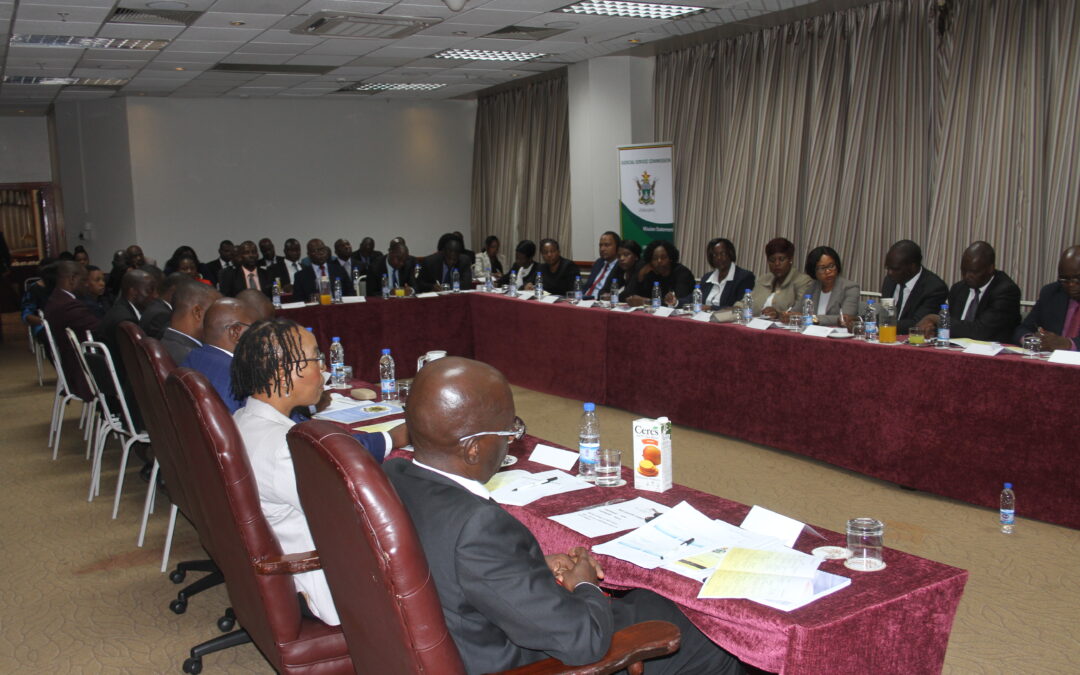
Nov 17, 2018 | News
The Judicial Service Commission (JSC) of Zimbabwe with the support of the ICJ convened a two-day workshop from 16 to 17 November 2018 in Harare to train magistrates designated to the anti-corruption court. 56 Magistrates (39 males 17 females) attended the Workshop.
Speaking during the workshop the Honourable Chief Justice, Luke Malaba encouraged the magistrates to work diligently to “flash out” corrupt elements from society.
He lamented that the current court practice seems to merely launder accused persons through constant remands which eventually lead to failed cases resulting in impunity for corruption in the country.
He pointed out that corruption is a threat to the rule of law urging the judiciary to be conscientious in dealing with corruption cases.
The workshop is part of a broader justice sector intervention by the JSC with the support of the ICJ, through generous funding provided by the European Union (EU) targeting combating corruption in the legal system.
The two-day training meeting looked at equipping 56 magistrates with the skills and knowledge to adjudicate cases of white-collar crime.
The training covered international best practices in the setting up of such courts, substantive law on corruption and practical court administration issues.
Besides the quality of the investigations, the effectiveness of the anti-corruption courts will also depend on the integrity and competency of the officers appointed to preside over them.
This workshop is one of a number of initiatives that the JSC are effecting with the support of the ICJ and the EU to contribute to a reduction in the levels of corruption and strengthen the ability of the justice system to resolve corruption and resource diversion cases in Zimbabwe.
Contact
Brian Penduka on brian.penduka(a)icj.org or +263772274307
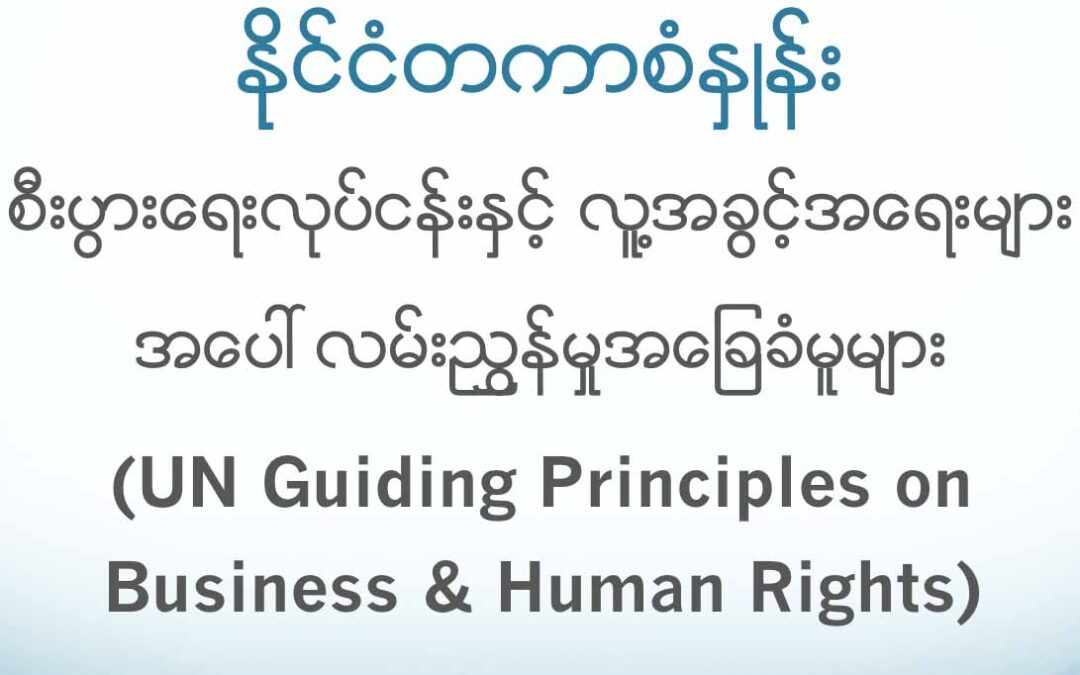
Jul 4, 2018 | News
The ICJ held a workshop in Mawlamyine on 3 July attended by religious leaders and youth activists from southern Mon State in Myanmar’s southeast.
The workshop aimed to facilitate discussion on strategic litigation options for communities adversely affected by existing and proposed investment projects.
The ICJ and civil society organizations have extensively documented how human rights abuses continue to occur in the context of business activities in Myanmar.
Communities generally have limited understanding of their rights, while government actors and businesses regularly flout their legal obligations.
The ICJ’s international legal adviser Sean Bain first set out applicable international standards, with a focus on the UN Guiding Principles on Business and Human Rights.
He identified Myanmar’s nascent legal framework for environmental protection as a key area of law with potential to deter rights abuses. He noted that while in December 2015 the Government of Myanmar issued the Environmental Impact Assessment Procedure, its provisions are rarely followed or enforced in practice.
Workshop participants, from two different areas of Mon State, shared experiences of community mobilization and ideas on how to use law to protect human rights.
Presentation on Corporate Social Responsibility
Prior to this workshop, also in Mawlamyine, on 29 June the ICJ’s legal adviser presented on Corporate Social Responsibility (CSR) at invitation of the national assembly of MATA, the Myanmar Alliance for Transparency and Accountability.
Introduced to Myanmar only in recent years, CSR activities are increasingly invoked by foreign and local companies as evidence of responsible investment.
But in reality, many companies doing CSR have been and continue to be involved in unlawful business activities, sometimes constituting human rights abuses.
Participants from different areas of Myanmar shared stories of businesses using CSR activities in a non-transparent way without accountability.
Cases were described where CSR has allegedly been associated with corruption, undermining trust and cohesion in communities affected by large investment projects.
The presentation from ICJ pointed out that while CSR activities are voluntary and without a specific legal framework, all businesses are subject to national law and should respect human rights in accordance with international law and standards, including the UN Guiding Principles.
Lawful conduct that respects human rights lies at the core of any responsible business, and CSR activities do not change these obligations.
These activities in Mon State are part of the ICJ’s ongoing support to civil society actors in Myanmar, from community-level up to national level actors.
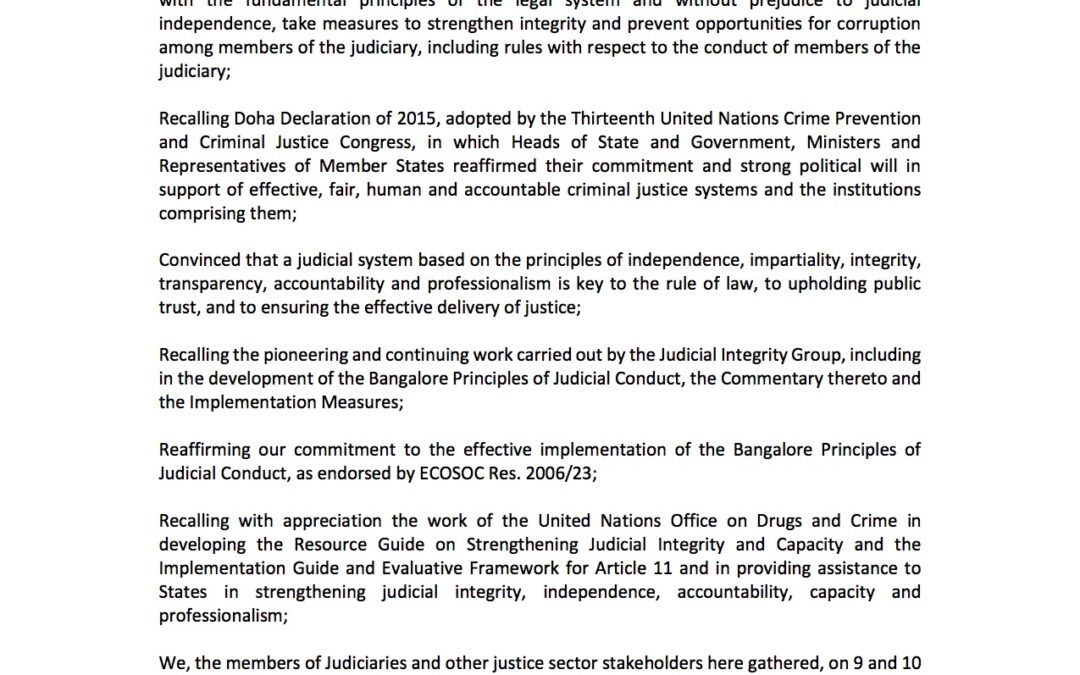
May 3, 2018 | News
The UN Office on Drugs and Crime (UNODC) today published a Declaration on Judicial Integrity, adopted by Chief Justices and other judges and stakeholders at the launch of a new Global Judicial Integrity Network in Vienna.
ICJ actively participated in the launch event, which took place 9-10 April at the UN offices in Vienna, Austria. It was one of the largest-ever gatherings of Chief Justices and other senior judges, together with other experts and stakeholders.
In addition to organising a panel discussion on judicial selection and appointment procedures in Southern and East Africa, the ICJ made the following statement to the plenary session of the launch event:
Throughout the decades since its inception in 1952, the primary and most effective means by which the International Commission of Jurists has worked to promote the rule of law around the world is precisely by bringing judges from different countries together to share experience and expertise with one another, and together to seek solutions to the common challenges they face. The Judicial Integrity Network should make a huge contribution by creating a platform for this kind of judge-to-judge engagement to take place on a global scale and a continuous basis. The sessions today and yesterday have truly illustrated the very great potential of the Network. The ICJ strongly supports the efforts of UNODC, Chief Justices, and other stakeholders to bring the Network into being, and we look forward to participating in it, promoting it, and using it in our own work with judiciaries around the world, in the years ahead.
The plenary session also accepted, by consensus, the ICJ’s proposal to include key language from the UN Basic Principles on the Independence of the Judiciary, in the Declaration.
The Declaration, Terms of Reference, and Participants List is available on the UNODC website here or can be downloaded from the following links:
Declaration on Judicial Integrity (UNODC event 2018)
UNODC GJIN Terms of Reference 2018
ICJ Practitioners Guide no 13, on Judicial Accountability, can be downloaded here: Universal-PG 13 Judicial Accountability-Publications-Reports-Practitioners Guide-2016-ENG
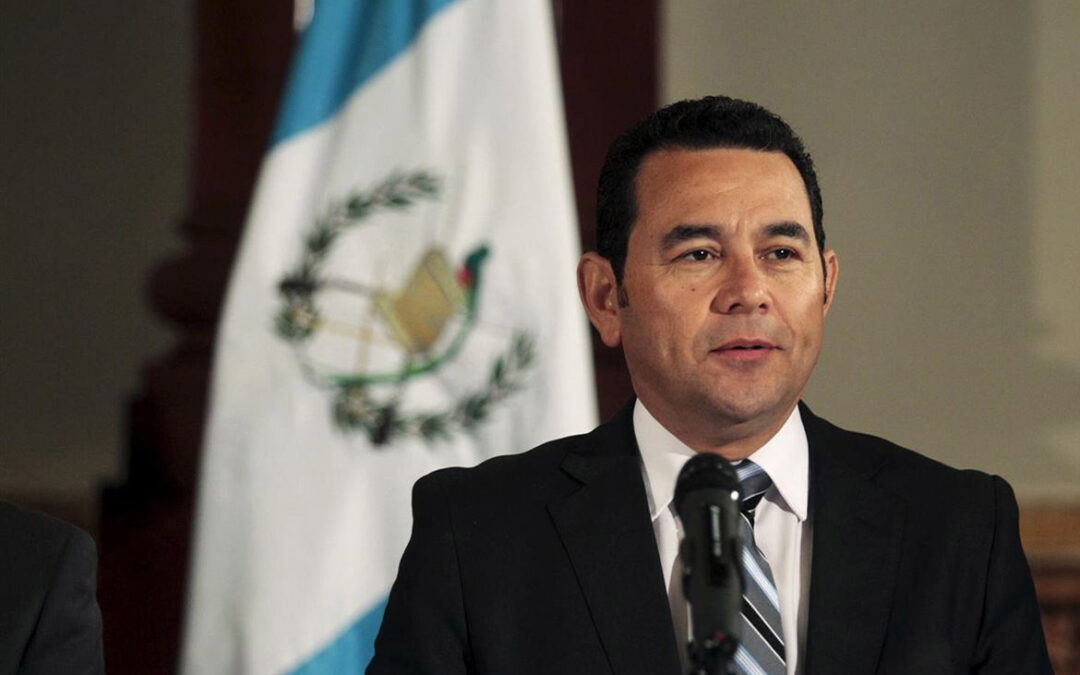
Sep 25, 2017 | News
Guatemala’s Congress should immediately remove obstacles to investigation and accountability of President Jimmy Morales (photo) and other public officials for alleged violations of campaign finance rules and corruption, the ICJ said today.
The ICJ also called on President Morales to cease efforts to impede the effective functioning of the United Nations mandated International Commission against Impunity in Guatemala (CICIG).
“Guatemala’s president and some members of Congress are obstructing justice by abusing their authority to avoid investigations for corruption and block the important work carried out by the Attorney General, with CICIG’s assistance,” said Sam Zarifi, ICJ’s Secretary General, just returned from a visit to the country.
“Guatemala, with CICIG’s assistance, has witnessed important progress in the fight against corruption and impunity in recent years, and Congress should be making sure that this trend continues,” he added.
The Congress voted on September 21 to reject the request by Attorney General Thelma Aldana and Ivan Velasquez, Commissioner of CICIG, to strip President Morales of Constitutional immunity he enjoys as president, in connection to allegations that his political party failed to report more than $800,000 in campaign financing.
But the Congressional vote fell short of the threshold of 105 votes needed to reach the necessary two-thirds of Congress needed to reach a final decision and thus can be reconsidered.
On September 13, Congress voted to revise the country’s criminal code by removing Secretary Generals of political parties from accountability for violations of electoral laws (instead limiting accountability to accountants) and to commute the sentences of those already convicted of a number of serious crimes, including corruption, trafficking of persons, and sexual abuse.
The legislators rescinded the vote after two days of nationwide public demonstrations and a decision of the country’s Constitutional Court to suspend the law’s application.
The Guatemalan Constitutional Court suspended the revisions in response to a writ of amparo and characterized Congress’ revisions to the criminal code as “a threat that, in case of being implemented, could cause irreparable damage to the judicial system”.
“The Constitutional Court’s speedy action avoided a massive blow to the fight for accountability in Guatemala, because if the law had gone into effect for even one hour, it would have provided a legal basis for politicians convicted on corruption charges to demand release or commutation of their sentences,” Zarifi said.
Congress’s actions followed an attempt by President Morales to expel CICIG’s Commissioner Velasquez, as persona non grata and to revise CICIG’s mandate, in an apparent bid to block investigations into his alleged wrongdoing.
“Since CICIG was formed in December 2006 at the request of the Guatemalan government, it has worked closely with the country’s Attorney General to improve accountability, and its impact has been undeniably positive,” Zarifi said.
“This is a model of international support for national accountability mechanisms that should be studied and emulated around the world; its continued operation is therefore of interest not just to Guatemala and the region but to global efforts to combat impunity,” he added.
The ICJ called on the Guatemalan government to comply with its international legal obligations as a State party to the 2004 United Nations Convention Against Corruption and the 1996 Inter-American Convention Against Corruption.
Background
Article 30(2) of the UN Convention Against Corruption calls on State Party to strike “an appropriate balance between any immunities or jurisdictional privileges accorded to its public officials for the performance of their functions and the possibility, when necessary, of effectively investigating, prosecuting and adjudicating offences established in accordance with this Convention.”
Article 30(3) demands States “to ensure that any discretionary legal powers under its domestic law relating to the prosecution of persons for offences established in accordance with this Convention are exercised to maximize the effectiveness of law enforcement measures in respect of those offences and with due regard to the need to deter the commission of such offences.”
Contact:
Sam Zarifi, ICJ Secretary General, t: +41 79 726 44 15 ; e: sam.zarifi@icj.org
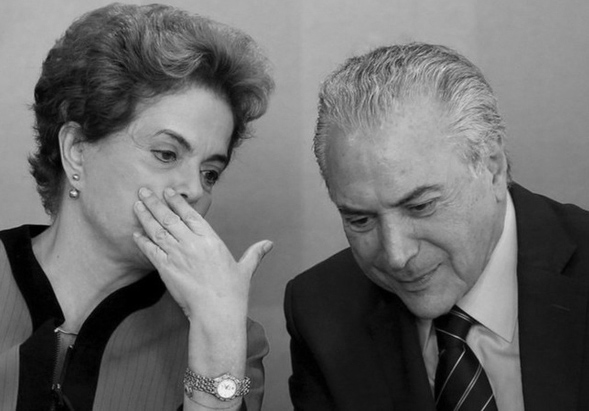
Jun 23, 2017 | News, Op-eds
An opinion editorial by Belisário dos Santos Júnior, a Brazilian lawyer who is a member of ICJ’s Executive Committee.
When assessing the Brazilian political situation, it is important to always mention the date, since the situation changes almost every minute, following the rhythm of denunciations and accusations.
Over the past three years, the main preoccupation of most people living in Latin America has been the level of violence in their countries.
In Brazil, however, although political and criminal violence is high, corruption has been the primary concern of the population, before health and with violence coming in only third position of the population’s concerns (source: Latino barômetro).
The yearly global corruption perception index of Transparency International put Brazil in the 79th position, of 176 countries rated (where 1st position is given to the country with the lowest perception of corruption and 176th given to the country with the highest perception of corruption) with a grade of 40 (0 is for the most corrupted countries and 100 for the cleanest ones).
Brazil was sharing its position with countries such as China, India and Belarus. Its grade was 3 points below the world average.
The report mentioned a clear relationship between corruption and inequalities, creating a vicious circle between corruption, unequal distribution of power and unequal distribution of wealth. How can we correct this?
Brazil is currently reacting to the problem with new laws, new police investigations and legal proceedings, which are important.
But these measures alone will not be enough to change a culture of bypassing laws into a culture of integrity and respect of honesty.
The last elected government, elected in 2014, with Dilma Rousseff as President and Michel Temer as Vice-President (photo), should have lasted until 2018 but fell in 2016 with the impeachment of Dilma Rousseff led by the President of the Federal Supreme Court and decided by the National Congress after two ballots.
Rousseff was accused of having manipulated the federal budget to hide the country’s real economic situation. Michel Temer assumed office as President following Rousseff’s impeachment.
Lula da Silva, the former President (2003-2010), ended his term in the middle of a legal storm when the Federal Supreme Court issued its judgment on the Criminal Lawsuit 470 (corruption of parliamentarians to maintain the influence of the Government in the Congress) and sentenced to prison ministers, businessmen, leaders of Lula’s Workers’ Party and other party leaders.
With the progressive use of the system of delação premiada (which is where a defendant is granted a reduced sentence or other beneficial measure for providing evidence against other persons), a measure included in the new Brazilian law to combat criminal organizations, and a series of police operations (the most famous of which is the operation Lava Jato, or ‘Car Wash’ in English), even more politicians and businessmen have been arrested and/or tried for corruption or money laundering.
More than one third of the National Congress’s members have been targeted by police operations for being implicated in controversial acts, either as agents or beneficiaries.
The current President, Michel Temer, and some of his ministers are under investigation by the Federal Police and on the verge of being denounced by the Federal Prosecutor’s Office for passive corruption.
The last two delação premiada, those of the CEOs of two Brazilian transnational corporations (Odebrecht and JBS), have overturned the political order, and so did the information that more than 2000 politicians received money from slush funds to finance their election campaigns.
Two governors and various parliamentarians are already in jail, including the former President of the Chamber of Deputies, Eduardo Cunha.
Lula da Silva himself is already facing various legal proceedings for corruption.
The winning ticket of the 2014 presidential election was recently judged in a case concerning potential abuse of economic power during their campaign.
Following a very close vote (4 against 3), the Superior Electoral Court rejected claims that illegal money was used in the Rousseff-Temer campaign.
If convicted, Michel Temer would have been forced out of the presidency.
The claim of economic power abuse was rejected only on a procedural matter: the evidence gathered – recordings, pictures, content of delação premiada – was considered inadmissible.
Aécio Neves, the opposition leader who competed against the Rousseff-Temer ticket in 2014, is in no better situation: a few weeks ago, a judicial decision deprived him of his mandate in the Federal Senate.
His sister and his cousin are already in jail and he himself is at risk of being sent to prison if the Federal Supreme Court requests this from the National Congress.
The Brazilian institutions are under investigation, but they are still functioning. Even members of the judiciary and the prosecutor’s office are being investigated.
There is still a decent level of trust in the work the current economic team is doing.
The National Congress gave its approval for the Constitutional Amendment on the Expenditure Ceiling, which will impose a series of conditions to public spending over the next few years. This somehow increases the credibility of the country’s economy.
On the agenda of the Congress, but affected by the series of denunciations for corruption that have hit parliamentarians, are the social security and labour reform bills considered essential for the future of the country by all the economic experts.
But it must also be noted that in the name of the fight against corruption, the Police and Federal Prosecutor’s Office have committed some abuses, to the point that a judge of the Supreme Court said Brazil was on the way to turning into a police state.
Corruption has reached such a level of intensity in the Brazilian political world that people are left in a severe and dangerous state of disappointment and despair. Already the current President is reaching a mere 1% approval rating…
Only elections would improve such a situation. The next presidential election is scheduled in 2018. But who will be eligible to run for it? The law prevents anyone who has a police record from applying.
However, society is reacting, taking various initiatives that value integrity measures, compliance actions, measures linked to education, in addition to the holding of intense debates demanding respect for democracy and human rights and calling for political reform.
Some people want direct elections now but this is contrary to the Constitution. However, 2018 is a long way to go and in the meantime there will be many public demonstrations.
But one thing is sure: Brazil is greater than the crisis it is facing now. This country has survived worse situations, including two long periods of dictatorship. Brazil will battle against this new agony. Respect for democracy, the Constitution and rule of law will prevail at the end.
A versão portuguesa pode ser descarregada abaixo:
Brazil-Corruption crisis-News-Op-ed-2017-POR (em PDF)









